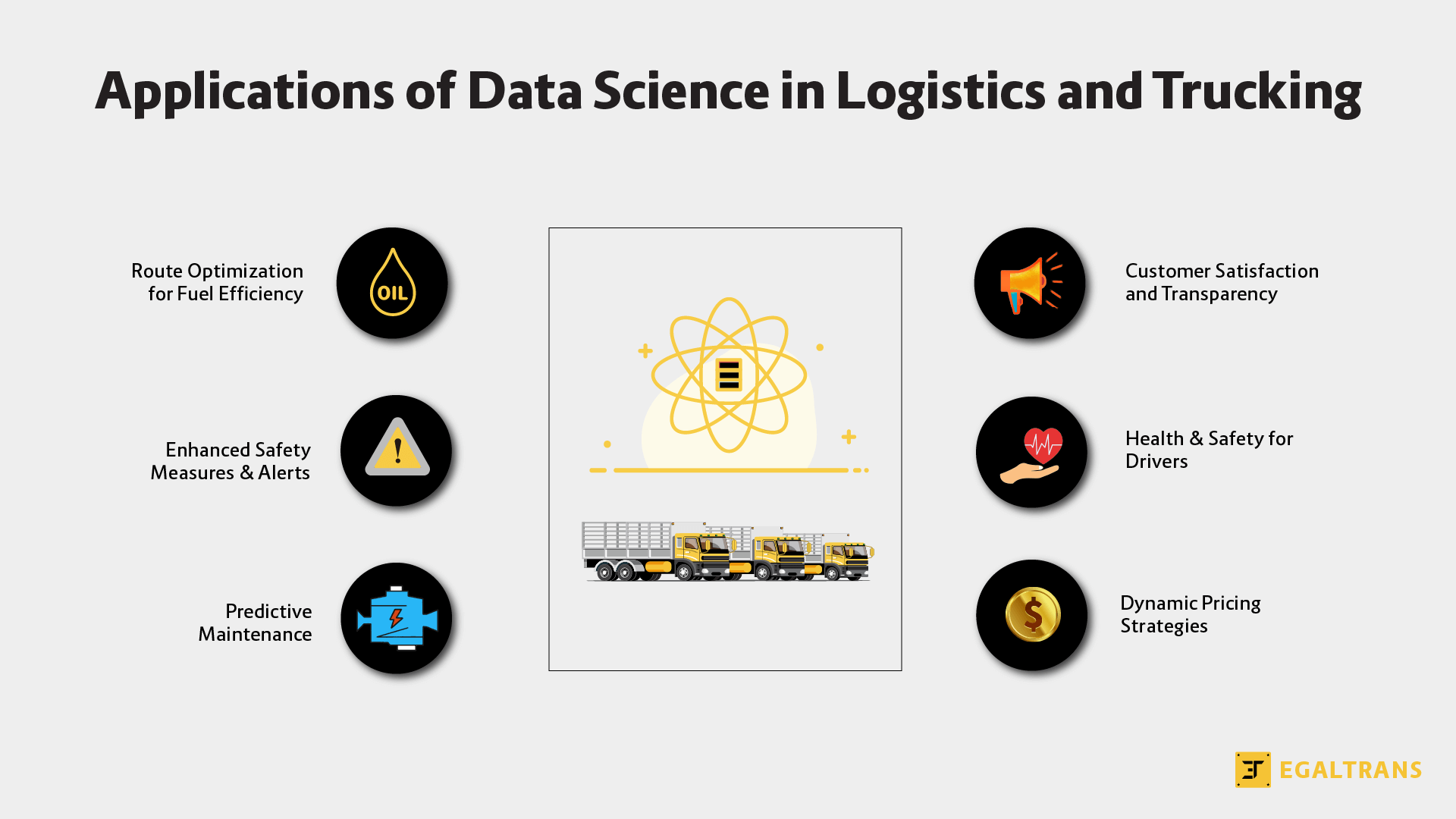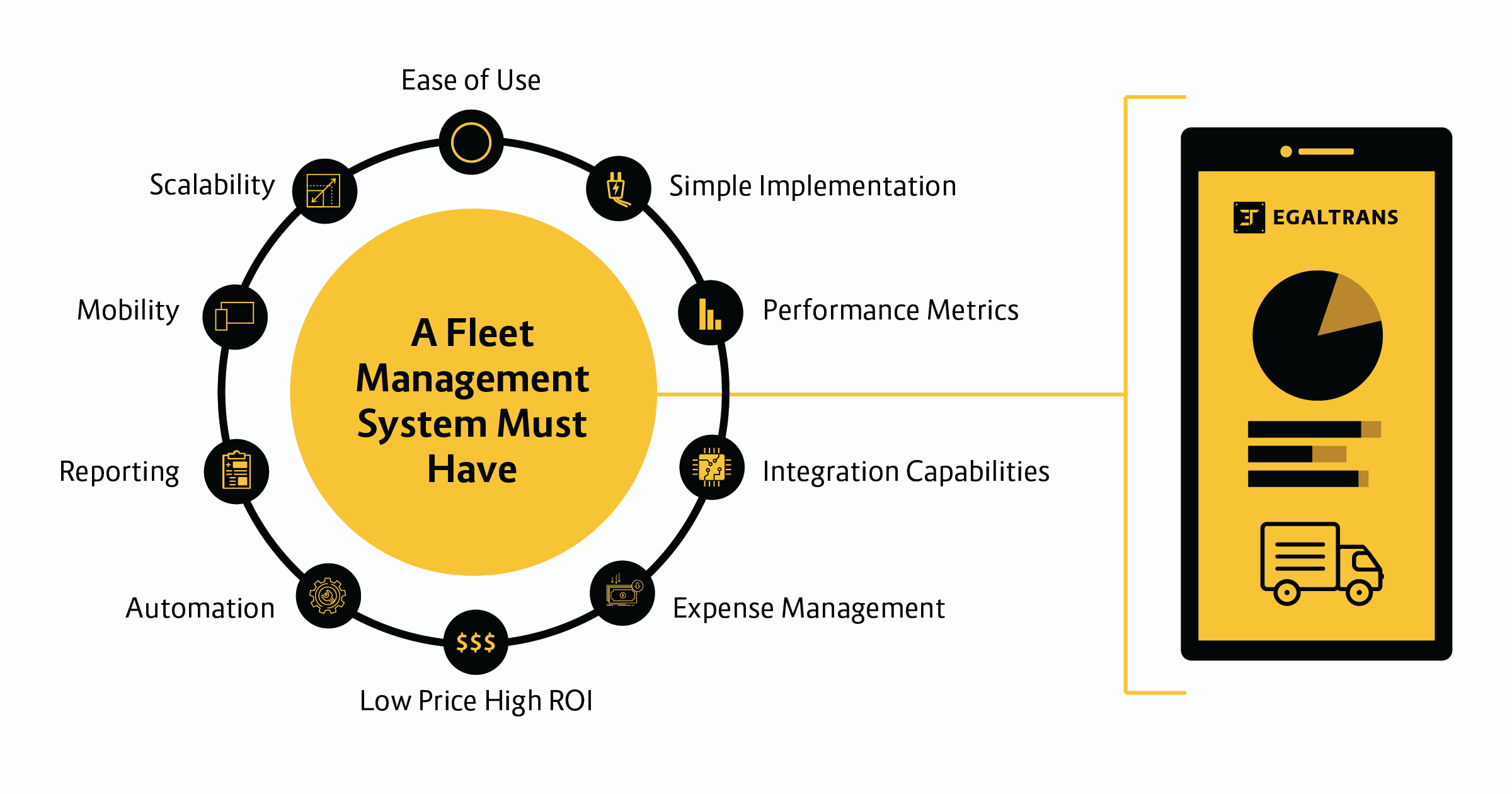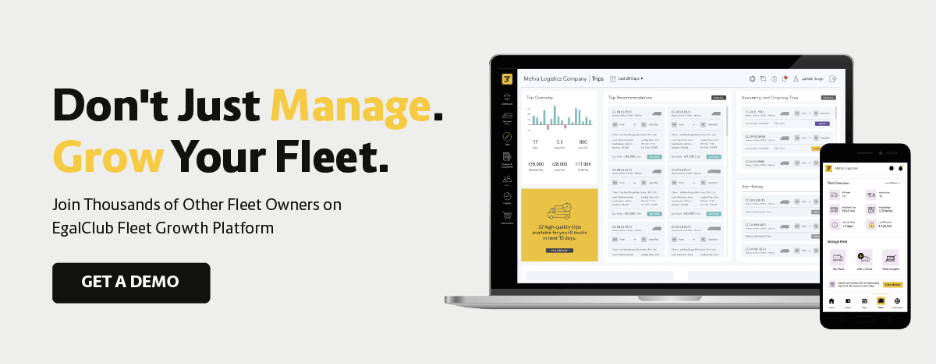Fleet management involves a wide range of activities and processes essential for ensuring the timely, cost-effective, and efficient operation of a fleet comprising five or more vehicles. This involves the coordination and supervision of a company’s vehicle fleet to optimize efficiency, reduce costs, and enhance overall performance.
In the context of trucking, this encompasses tasks such as vehicle maintenance scheduling, route planning, fuel management, and driver monitoring. For instance, a trucking company employing fleet management may utilize GPS tracking to monitor the real-time location of trucks, ensuring efficient route planning to minimize fuel consumption and delivery time. Additionally, preventive maintenance schedules can be implemented, preventing breakdowns and minimizing downtime. Through effective fleet management, trucking companies can improve operational productivity, reduce operational costs, and enhance overall logistics efficiency.
What is Fleet Management
Fleet management is a comprehensive approach to overseeing and optimizing a company’s vehicle fleet. This includes a range of tasks and responsibilities, from vehicle acquisition and maintenance to driver management, route planning, and regulatory compliance. The primary goal of fleet management is to enhance operational efficiency, reduce costs, ensure compliance with regulations, and promote overall safety. Here’s a detailed exploration of fleet management and its numerous benefits.
Key Components of Fleet Management
- Vehicle Acquisition and Disposal: Fleet managers are responsible for acquiring vehicles suitable for the company’s needs. This involves considering factors such as vehicle type, fuel efficiency, and technology integration. Disposing of older vehicles in a timely manner is also crucial to maintain a modern and efficient fleet.
- Maintenance and Repairs: Regular maintenance is essential for keeping the fleet in optimal condition. Fleet managers schedule routine inspections, preventive maintenance, and handle repairs promptly to minimize downtime and ensure the safety of drivers.
- Driver Management: Fleet management involves overseeing drivers, ensuring they comply with safety regulations, managing work schedules, and providing necessary training. Driver monitoring systems can be implemented to track behavior, promote safe driving habits, and enhance overall road safety.
- Fuel Management: Controlling fuel costs is a significant challenge for fleet managers. Efficient fuel management involves monitoring fuel consumption, adopting fuel-efficient technologies, and devising strategies to cope with fluctuating fuel prices.
- Route Planning and Optimization: Optimizing routes is crucial for minimizing fuel consumption, reducing delivery times, and enhancing overall operational efficiency. Fleet management systems use advanced algorithms to analyze data and suggest optimal routes based on various factors like traffic conditions and delivery priorities.
- Telematics and Technology Integration: Fleet management embraces technology, with telematics playing a central role. Telematics systems gather data from vehicles, providing insights into driver behavior, vehicle health, and overall fleet performance. Integrating this technology aids in making informed decisions for better efficiency.
- Compliance and Regulatory Management: Staying compliant with a myriad of regulations, from safety standards to environmental requirements, is a critical aspect of fleet management. Failing to comply can result in legal issues and financial penalties.
- Environmental Sustainability: With a growing emphasis on sustainability, fleet managers are increasingly focused on reducing the environmental impact of their operations. This involves adopting eco-friendly vehicles, optimizing fuel efficiency, and incorporating green practices into daily operations.
It is therefore necessary to have the above mentioned characteristics in your fleet management system. When buying a fleet management software/system there are many things to consider before making the important decision, hence fleet managers should not rush into the decision and make sure about the characteristics and features of their fleet before investing in the software.
Benefits of Fleet Management
According to a recent study by the Central Institute of Road Transport (CIRT), 77% of transport companies have a small fleet of less than ten trucks. Most of them are independent truck drivers and Only 6% of trucks are owned by companies with 20 or more trucks, making it difficult to achieve goals such as fuel savings, environmental protection. Planned maintenance and fleet management promotes road safety with existing structures.
Fleet management is a multifaceted discipline that plays a pivotal role in the success of businesses relying on a vehicle fleet.
- Cost Savings: Effective fleet management can lead to significant cost savings. By optimizing routes, improving fuel efficiency, and implementing preventive maintenance, companies can reduce operational expenses. Streamlining operations through efficient route planning and better utilization of resources results in increased productivity. Reduced downtime, quicker deliveries, and improved vehicle usage contribute to a more productive fleet.
- Enhanced Safety: Fleet management systems help monitor driver behavior and promote safe driving practices. This, combined with ongoing training programs, contributes to a safer work environment, fewer accidents, and lower insurance costs. The enhanced safety also leads to more people joining the fleet business as truck drivers or even starting their own fleet businesses.
- Improved Vehicle Lifespan: Regular maintenance and prompt repairs extend the lifespan of vehicles, reducing the need for frequent replacements. This not only saves on acquisition costs but also contributes to sustainability by minimizing environmental impact. Fleet managers can monitor vehicle locations, track deliveries, and respond promptly to any issues, improving overall operational control.
- Regulatory Compliance: Fleet management systems assist in staying compliant with various regulations. This reduces the risk of legal issues, fines, and disruptions to operations, ensuring a smoother and more reliable business operation.
- Data-Driven Decision Making: Fleet management systems generate a wealth of data that can be analyzed to make informed decisions. This data-driven approach helps in identifying areas for improvement, optimizing routes, and enhancing overall fleet performance.
- Enhanced Customer Service: By improving delivery times, reducing errors, and providing accurate tracking information, fleet management contributes to enhanced customer satisfaction. Satisfied customers are more likely to become repeat customers, fostering long-term business relationships.
- Sustainability and Corporate Social Responsibility: Adopting environmentally friendly practices, such as using fuel-efficient vehicles and optimizing routes, aligns with corporate social responsibility (CSR) goals. This not only benefits the environment but also enhances the company’s image and brand reputation.
The numerous benefits, ranging from cost savings to improved safety and sustainability, underscore the importance of adopting robust fleet management practices in today’s competitive and dynamic business environment.
Roles of Fleet Managers
Using a vehicle for business can bring about many challenges which are important to process so as to make your business successful in a competitive industry. The fleet managers are responsible for taking care of these issues and challenges. Fleet managers play a pivotal role in optimizing truck fleet management, ensuring efficient operations and cost-effective strategies. They are responsible for overseeing various key functions, including:
- Vehicle Maintenance and Compliance: Fleet managers ensure trucks are regularly serviced, maintaining optimal performance and complying with safety regulations. This proactive approach minimizes downtime and enhances overall fleet reliability.
- Route Optimization and Fuel Efficiency: Implementing advanced routing technologies, fleet managers optimize delivery routes to reduce fuel consumption and enhance efficiency. This not only lowers operational costs but also minimizes environmental impact.
- Driver Management and Training: Efficient fleet managers oversee driver selection, training, and performance monitoring. By promoting safe driving practices and addressing issues promptly, they contribute to improved overall fleet safety and compliance.
- Asset Tracking and Telematics: Leveraging telematics systems, fleet managers monitor vehicle locations, performance metrics, and driver behavior in real-time. This data-driven approach allows for informed decision-making and enhances overall fleet visibility.
- Cost Management: Fleet managers analyze and control operational costs, negotiating favorable contracts with suppliers, monitoring fuel expenses, and optimizing maintenance schedules. This cost-conscious approach contributes to the financial health of the fleet.
- Regulatory Compliance: Staying abreast of industry regulations, fleet managers ensure that their operations adhere to legal requirements, avoiding fines and penalties. This commitment to compliance fosters a positive reputation for the fleet.
Fleet managers play a pivotal role in orchestrating the seamless functioning of vehicle fleets, balancing time, budget, and efficiency. Their strategic decision-making, meticulous planning, and adept oversight contribute significantly to the success of any organization relying on a fleet for its operations. As technology evolves, so does the role of fleet managers, underscoring the importance of their adaptability and forward-thinking approach in navigating the ever-changing landscape of transportation management.
![]()
Challenges faced by Fleet Managers
- Regulatory Compliance: Navigating the complex web of regulations is a major challenge for fleet managers in India, who face challenges in complying with various state and national regulations such as emission standards, pricing policies, and weight limits. Staying current with the evolving regulatory landscape is critical to avoiding penalties and ensuring smooth operations. A study by the Federation of Indian Chambers of Commerce and Industry (FICCI) found that navigating these regulatory mazes leads to operational efficiencies and has a better impact on the overall productivity of fleet operations.
- Fluctuations in fuel prices: Fluctuations in fuel prices add further complexity to the trucking business. Fleet managers in India constantly struggle with the challenge of managing fuel costs, which negatively impacts overall profitability. Deploying fuel-efficient technologies and adopting strategic fuel management practices will be essential to reducing the impact of fuel price fluctuations.
- Route Optimization: Maximizing efficiency in route planning and navigation helps minimize fuel consumption and reduce delivery times. Fleet managers must continually assess and optimize routes to enhance overall operational efficiency. This will save fleet costs and make the business more eco-friendly.
- Vehicle Remarketing: Managing vehicle condition, sales channels, and timing of sales (when fixed and variable costs are lowest) is key to achieving optimal remarketing value. Keeping your vehicle clean and well-maintained and using the included accessories (extra key fobs, mats, headrests, etc.) will help you achieve a better selling price.
Overcoming resistance to change and ensuring a smooth transition to technology-driven solutions is critical to stay competitive in the modern trucking industry. Thus the role of fleet managers in the management of fleets is very essential for the business to thrive and be successful in moments and times which can be testing for the business.
Components/Features of Fleet Management
Fleet management is the linchpin of efficient and streamlined operations for businesses relying on a fleet of vehicles. As technology continues to advance, the components and features of fleet management systems have become pivotal in optimizing performance, enhancing safety, and ensuring regulatory compliance. At a high level, fleet management software impacts people and businesses. Now let’s look at the impact on shipping, vehicles, repairs, and maintenance.
- Fuel Reduction Fleet Management Software: It helps reduce fuel costs for drivers and the entire fleet.You can also determine if your vehicle is simply using too much fuel and becoming less efficient. Many softwares have been made available to track the fuel utilization and optimisation which can help in saving fuel costs for the fleet. There are various fleet management software options for trucks, such as Samsara, Geotab, and KeepTruckin. These solutions typically offer features like GPS tracking, maintenance monitoring, and driver behavior analysis. It’s essential to choose one that suits the specific needs and size of your trucking business.
- Optimized route configuration: In general, this software is best suited for route configuration optimization. Running routes using fleet management software can help you run routes faster and more efficiently.
- Maintenance and Repair Configuration: Fleet operators can submit repair and maintenance tickets as needed. One of the best ways to accomplish this is to integrate work order software systems into your overall fleet management structure.
- Optimize Driver Safety: Fleet management software can also monitor inventory and parts installed on vehicles to ensure vehicles are operating efficiently and safely. This is part of a high quality inventory management solution. Implementing safety measures like driver training programs, regular vehicle maintenance, and monitoring driving behavior through telematics can enhance overall safety and reduce accidents. Additionally, utilizing technologies such as dashcams and driver monitoring systems contributes to a proactive approach in addressing potential safety issues.
- Vehicle maintenance software plays a vital role in truck fleet management by ensuring timely and efficient maintenance. These systems help schedule and track routine maintenance tasks, monitor vehicle diagnostics, and manage repair history. Implementing such software aids in preventing breakdowns, optimizing vehicle performance, and extending the lifespan of the trucks in the fleet. It
also facilitates compliance with regulatory maintenance requirements and contributes to overall cost savings by minimizing unexpected repairs.
By embracing these features, organizations can not only optimize their current operations but also position themselves for future success in a rapidly changing industry. The road ahead demands a proactive approach to fleet management, where each component plays a crucial role in steering businesses toward a more efficient, resilient, and future-ready fleet.
What is a Good Fleet Management Software
Fleet management solutions leverage technologies such as GPS, geofencing, AI, machine learning, and predictive analytics to help your business run smoothly and increase productivity. Common fleet management capabilities include fraud reduction, digital transformation, tax compliance and reporting, route optimization, and tracking.
- Real-Time Tracking: Provides accurate and up-to-date location information for each truck in real-time.
- Route Optimization: Optimizes routes to improve fuel efficiency, reduce travel time, and enhance overall fleet productivity.
- Vehicle Maintenance Tracking: Monitors and schedules maintenance tasks, reducing downtime and extending the lifespan of trucks.
- Fuel Management: Tracks fuel consumption, identifies inefficiencies, and helps optimize fuel usage for cost savings.
- Driver Performance Monitoring: Evaluates driver behavior, including speed, braking, and idling, promoting safer driving practices and reducing operational risks.
- Comprehensive Reporting: Generates detailed reports on various metrics such as fuel efficiency, maintenance history, and driver performance for informed decision-making.
- Integration Capabilities: Easily integrates with other systems, like ERP or accounting software, to streamline data flow and improve overall fleet management.
- User-Friendly Interface: Intuitive and easy-to-use interface for efficient navigation and quick access to essential information.
- Alerts and Notifications: Sends real-time alerts for issues such as maintenance reminders, deviations from planned routes, or unauthorized vehicle use.
- Scalability: Adaptable to the growing needs of the fleet, allowing for the addition of vehicles and functionalities as the business expands.
Examples of a few Good Fleet Management Software
1. EgalClub Fleet Growth Platform
EgalClub Fleet Growth Platform is an integrated solution for automating mundane fleet operations and lets fleet owners/operators focus on business growth. With live location tracking, fuel monitoring, finance tools, business tools, maintenance alerts, and growth insights, on an integrated platform, EgalClub FGP gives fleet owners the power to shift their focus from managing individual trucks to growing their trucking business.
2. RocketFlow
RocketFlow’s fleet management software allows you to manage your vehicle/logistics transportation operations in an easy and user-friendly way. Manage your marketplace, activate drivers and managers, adhere to SOPs, perform live GEO tracking and collect data, get real-time reports, and work digitally. You can also automate the process of receiving reservations for retail and business users.
3. Fleetio
Fleetio propelled in January 2012, and nowadays thousands of individuals utilize Fleetio to oversee hundreds of thousands of vehicles, hardware, parts, drivers and more. Over a long time they’ve worked with fleets of 10 vehicles to thousands, and the mission is still the same. Fleetio helps organizations track, analyze and make strides in their fleet operations.
4. Fleetx
Fleetx give a real-time, 360-degree see of your fleet’s every day operations, in this manner lessening costs, expanding efficiency & remain on best of vehicle upkeep with Cleverly Vehicle Following Framework.
How is Fleet Management Evolving
The trucking industry has witnessed a transformative shift in the way fleets are managed, thanks to advancements in technology and a growing emphasis on efficiency, safety, and sustainability. The below given information provides an insight into the evolving landscape of fleet management in the trucking industry, highlighting key trends and innovations that are shaping the future.
- Telematics and Connectivity: One of the most significant developments in fleet management is the widespread adoption of telematics. Telematics systems, utilizing GPS technology and sensors, provide real-time data on vehicle location, speed, fuel consumption, and engine health. This connectivity allows fleet managers to optimize routes, enhance fuel efficiency, and proactively address maintenance issues, resulting in cost savings and improved operational effectiveness.
- Predictive Analytics for Maintenance: The integration of predictive analytics has revolutionized how fleets approach vehicle maintenance. By analyzing historical data and monitoring real-time performance metrics, fleet managers can predict potential issues before they escalate, reducing downtime and extending the lifespan of their vehicles. This proactive approach not only saves costs but also enhances overall fleet reliability.
- Automation and Autonomous Vehicles: The trucking industry is on the brink of a technological revolution with the introduction of automation and autonomous vehicles. While fully autonomous trucks are still in the testing phase, semi-autonomous features, such as lane-keeping assistance and adaptive cruise control, are becoming more prevalent. Fleet managers are exploring how these technologies can improve safety, reduce driver fatigue, and optimize fuel efficiency.
- ELD Mandate Compliance: The implementation of the Electronic Logging Device (ELD) mandate has had a profound impact on fleet management practices. ELDs track driving hours electronically, ensuring compliance with Hours of Service regulations. This shift from paper logs to digital monitoring enhances accuracy, reduces paperwork, and promotes safer driving practices.
- Sustainable Practices: Sustainability is a growing concern in the trucking industry, and fleet management is adapting accordingly. The integration of electric and hybrid vehicles into fleets, along with the optimization of routes for fuel efficiency. Fleet managers are increasingly exploring eco-friendly solutions to meet both regulatory requirements and consumer expectations.

In conclusion, fleet management in the trucking industry is evolving at a rapid pace, driven by technological advancements and a commitment to efficiency and sustainability. As we navigate the future, embracing innovations such as telematics, predictive analytics, automation, and sustainable practices will be crucial for staying competitive and meeting the challenges of an ever-changing industry landscape.
Frequently Asked Questions
- Why is fleet management important?
Fleet management is vital for organizations as it provides a comprehensive approach to overseeing and controlling a fleet of vehicles. It ensures efficient resource utilization, reduces operational costs, and enhances overall productivity. Safety measures incorporated in fleet management contribute to preventing accidents and promoting a secure working environment.
- Why do you need fleet management?
The need for fleet management arises from the complexity of coordinating and optimizing diverse aspects of vehicle operations. By tracking fuel consumption, scheduling maintenance, and utilizing real-time data, businesses can respond promptly to challenges, minimize downtime, and make informed decisions .
- Who uses fleet management?
Fleet management is utilized across various industries, including logistics, shipping, construction, and public services. Organizations that rely on transportation for goods or services leverage fleet management systems. It helps to gain visibility into vehicle performance, monitor driver behavior, and comply with regulatory standards.
- How is the role of fleet managers evolving?
The evolving role of fleet managers embraces technological advancements. Beyond traditional responsibilities, they now focus on leveraging telematics for real-time monitoring, implementing data analytics for predictive maintenance. Proactive risk management, including cybersecurity considerations, has also become integral to their evolving role.
- What are the skills needed to become a fleet manager?
To excel as a fleet manager, individuals need a blend of technical expertise and interpersonal skills. Proficiency in vehicle maintenance, understanding of regulatory compliance, and staying abreast of emerging technologies are crucial. Effective communication, leadership, and problem-solving skills enable fleet managers to coordinate with diverse teams. Also helps in fostering collaboration, and address challenges in an ever-changing operational landscape







